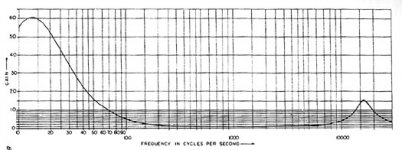I have experimented on an equalizer and found the points which satisfy me were +30dB @ 50Hz and +10dB @ 10kHz. Is it possible to build a loudness circuit that boosts bass to +30dB? Will it cause any problem, such as distortion? Also, if the loudness were built, with +30dB boost at bass, is it possible to add a tone control of +/- 10 dB @ 50Hz? Again, will this cause a problem?
I have experimented on an equalizer and found the points which satisfy me were +30dB @ 50Hz and +10dB @ 10kHz. Is it possible to build a loudness circuit that boosts bass to +30dB? Will it cause any problem, such as distortion? Also, if the loudness were built, with +30dB boost at bass, is it possible to add a tone control of +/- 10 dB @ 50Hz? Again, will this cause a problem?
sounds like bose eq circuit
Attachments
Last edited:
Why not build one of the "classic" aural compensation circuits, ala McIntosh? See if that satisfies - if not, maybe what Pano points out is true for your system.
I was a teenager. My fried took me to his friend's place, where his father had a McIntosh component system with large Klipschorns in the family room. I asked "can I touch?" Sure! I grabbed me a big scoop of aural-compensation (as in "wonder what this control does?") and Ummmm, I like that!
I was a teenager. My fried took me to his friend's place, where his father had a McIntosh component system with large Klipschorns in the family room. I asked "can I touch?" Sure! I grabbed me a big scoop of aural-compensation (as in "wonder what this control does?") and Ummmm, I like that!
Interesting. An aural compensation seems to equal to a contour or a variable loudness for some companies. However, as I played with this function on my another amp, I thought playing with tone control was more favorable to me, since it would interfere only the involved frequencies as depicted in #3. I’m unsure whether Bose’s circuit has any special design for its equipment as its one-ohm designed speaker. The concerned thing for me is the distortion that may occur since +30dB is indeed over boosting as stated in #1.
The Bose EQ is a fixed circuit meant to compensate their speaker response. Loudness compensation is a need that varies with play volume, a fixed amount would only be correct at one volume. Loudness comp, in all its various forms, never hit +30dB.
The classic Fletcher-Munson curves are incorrect, limited by the equipment of 1933, and tested with tones in an anechoic room. ISO226 is the current favorite. It's a family of curves.
The classic Fletcher-Munson curves are incorrect, limited by the equipment of 1933, and tested with tones in an anechoic room. ISO226 is the current favorite. It's a family of curves.
It's interesting that you're concerned with distortion from a circuit with 20dB more compensation than is necessary because you seem to wish to ignore the entire knowledge base regarding loudness compensation, and it seems may have no way to measure distortion.Interesting. An aural compensation seems to equal to a contour or a variable loudness for some companies. However, as I played with this function on my another amp, I thought playing with tone control was more favorable to me, since it would interfere only the involved frequencies as depicted in #3. I’m unsure whether Bose’s circuit has any special design for its equipment as its one-ohm designed speaker. The concerned thing for me is the distortion that may occur since +30dB is indeed over boosting as stated in #1.
After 3 separate but related threads, what exactly are you trying to accomplish?
Thanks jaddie for giving me excellent advices. I now found the solution after read on all comments from all people and experienced with my equipments. My next diy project would be involving to an aural compensator and a variable loudness. Now I’m gathering information for it.
Last edited:
The Bose EQ is a fixed circuit meant to compensate their speaker response.
That reminds me of a funny blast from the past. I remember from the Midwest Acoustics Conference back in about 1974, a presenter made a great comment about the Bose 901 speaker: "Anyone can take a bunch of cheap drivers, equalize the pi** out of them, and make them sound halfway decent". It was so funny, I'll never forget it - because it's so true!
I spose when we post, we should avoid getting to wrapped around the axle of the apparent results of our effort. My own efforts get skipped right past at times. You'll never know who silently reads and is helped by an idea we bother to put forth.
>"Anyone can take a bunch of cheap drivers, equalize the pi** out of them, and make them sound halfway decent".
Sounds like clever engineering taken to a successful commercial end to me. Can just "anyone" do that? I'd bet some of our commercial speaker builders would be ecstatic to have 1/10 of the popularity of the 901 - That'd make a living.
>"Anyone can take a bunch of cheap drivers, equalize the pi** out of them, and make them sound halfway decent".
Sounds like clever engineering taken to a successful commercial end to me. Can just "anyone" do that? I'd bet some of our commercial speaker builders would be ecstatic to have 1/10 of the popularity of the 901 - That'd make a living.
That's very true and good rule to go by. The silent readers here vastly outnumber those who post.You'll never know who silently reads and is helped by an idea we bother to put forth.
- Status
- This old topic is closed. If you want to reopen this topic, contact a moderator using the "Report Post" button.
- Home
- Source & Line
- Analog Line Level
- Loudness Level
